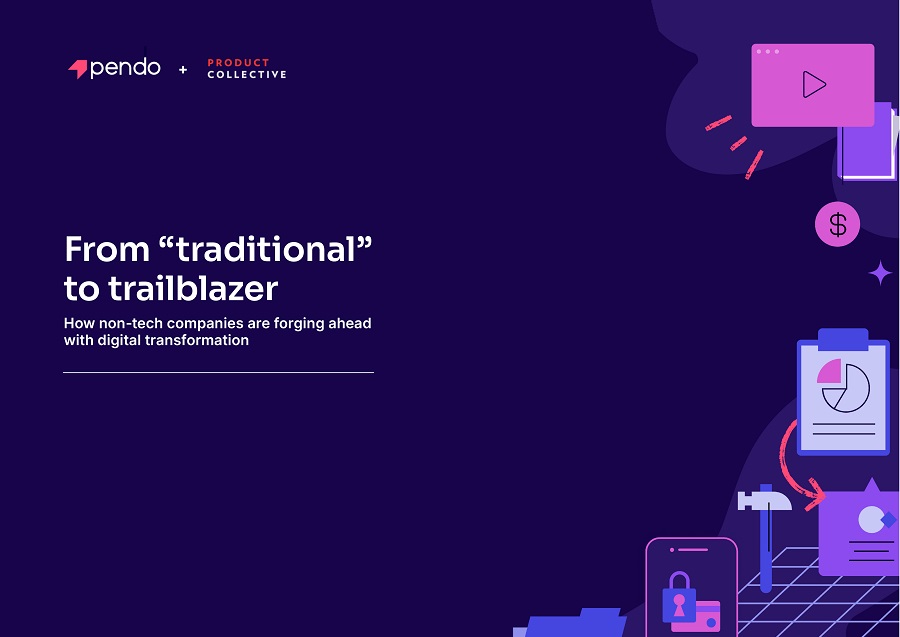Automation & Digital Transformation
Automatic equipment in a manufacturing, warehousing and distribution, Industrial and Autonomous research robots, Robotic process automation (RPA) and other processes or facilities.Half of ‘Non-Tech’ UK Enterprises Consider Themselves Technology Companies Since the Pandemic

The pandemic years forced traditional industries to digitise their operations at speed, but three years on, non-tech enterprises across the UK – from sectors including finance, advertising, manufacturing and more – are actively embracing the ‘tech mindset’ more than ever, according to new research. The study from Pendo, the all-in-one product experience platform, has found nearly half (49%) of ‘traditional’ enterprises now consider themselves as technology companies, and are adopting more ‘tech-like’ strategies, roles and tools to drive innovation and growth.
The mindset shift
Technology companies are known for prioritising agility, innovation, and growth-oriented business strategies. Sophisticated R&D and digital product teams are also a key hallmark of these organisations, central to both a tech company’s culture and acting as the main driver of its growth and change.
Surveying R&D leaders and senior leadership at large companies with 500+ employees outside of the IT, software and hardware industries, Pendo found clear evidence of an overall shift towards the tech mindset: 65% cited agility, innovation and growth as their key focus today, with 34% already operating this way and nearly a third in the process of pivoting. Despite over half (56%) of those who consider themselves a technology company not even having a digital product or app live yet, the mindset focus and desire for the tech label demonstrates these companies’ strategic trajectory and the first step of widespread cultural change.
Tech talent has been snapped up – and ‘non-tech’ is still hiring
As tech companies have made significant layoffs in recent months in response to the economic downturn, R&D talent is still in high demand among traditional enterprises. Product management teams – historically a staple function of tech organisations – have grown in headcount by about 9% since 2021 within traditional enterprises and are projected to continue growing at the same rate despite the downturn. For the majority of these companies (59%), the new hires have come primarily from tech companies, with these hires the biggest drivers of cultural change and mindset shift.
In the last two years, there’s been a strong focus on hiring data analytics roles, but companies are nowhere near filling their analytics teams fully — almost half (44%) of product teams in traditional enterprises say data analytics roles are most needed. The even greater need is for product management and growth roles, which over half of respondents (51%) say are key hires to achieve their business goals.
The data is clear – R&D and digital product focused roles and teams are becoming essential to businesses and their bottom line. Interestingly, while ex-tech company hires have helped fill roles to date, there is a huge appetite today for upskilling and training initiatives, with 37% of product teams keen to fill future roles predominantly from within their existing teams.
Digital customer experiences become key to growth
Product-led growth (PLG) strategies have been used by tech companies for years as a means to achieve efficiency and drive growth. Rather than relying heavily on more classic sales and marketing tactics, PLG puts an organisation’s digital products at the forefront of the business strategy as a means to drive customer acquisition, retention and expansion. This might be using prompts in-app to upsell new features or using app usage data to understand and improve the end-user experience to be as intuitive and valuable as possible which, in turn, drives customer loyalty.
Unsurprisingly in the current downturn, efficiency and PLG, which go hand in hand, are the number one priority for traditional enterprises, but PLG also ranked alongside it. It’s clear industries outside of technology are beginning to recognise how important delivering a high-quality digital customer experience can be to achieving growth, tapping into new revenues and creating greater efficiencies.
“The lines are blurring between traditional and technology companies. While the pandemic certainly encouraged – or in some cases, forced – traditional enterprises to think more seriously about digital, it’s evident from our research this trend is only continuing to grow and traditionally “tech” strategies, tools and talent are driving this digital acceleration forward,” comments Spencer Earp, MD of EMEA at Pendo. “Digital product is no longer a nice-to-have but an increasingly essential source of revenue and an invaluable customer touchpoint whatever your business sells or does. Any enterprise looking to survive or even thrive during the downturn does well to do so by putting product at the front of their strategy and investing in the right tools and talent to strengthen both their business and their bottom line.”
New tools are helping R&D teams thrive – but the jury’s out on AI
The shift in business strategy and tactics has been complemented by investment in tools that are also more traditionally associated with tech companies. Product analytics tools rank highest among product teams in non-tech companies in terms of ROI – 75% that have already adopted these have seen a positive impact, with 4 in 5 valuing the ability to make informed decisions and 78% finding that product data and analytics are increasing efficiency when building digital products.
Despite the noise we’re seeing around AI, product teams rank these tools as the least important in the UK and very few are leveraging AI/ML tools today. This is in contrast to the US which is far more advanced in the excitement for and adoption of AI/ML tools, with 77% of US product teams already seeing these have a positive effect on their product development.
Interestingly, there is an expectations gap between senior leadership and R&D teams on-the-ground around AI skills too, with 51% of top enterprise leaders seeing these as important skills to realising business goals versus just 26% of middle managers and contributors.
To read the full global report, please visit: From “traditional” to trailblazer: How non-tech companies are forging ahead with digital transformation










